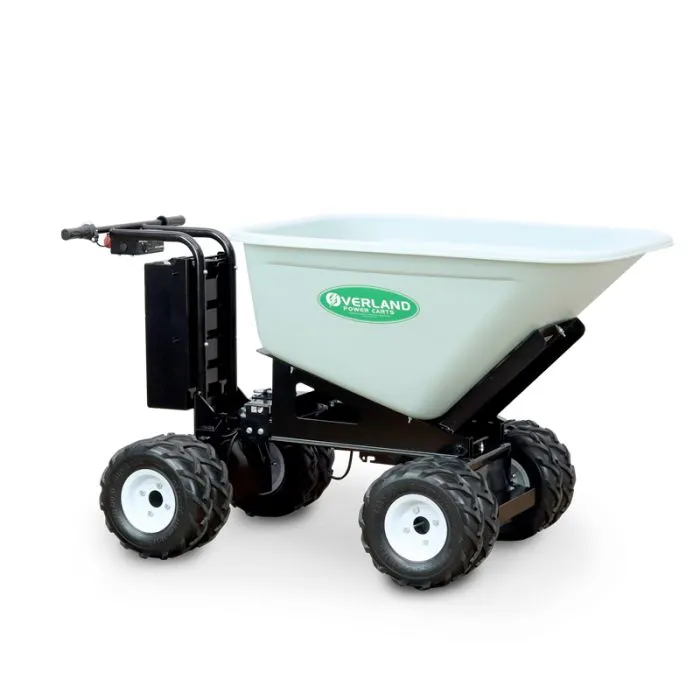Granite Power Carts, long recognized for their robust 4-wheel-drive (4WD) utility vehicles, carved a niche in the off-road market. Built to excel in rugged terrains like farms, construction sites, and large properties, these carts earned a reputation for durability, strength, and reliability. Introduced by Granite Industries Inc., these carts featured innovative engineering and powerful engines tailored for heavy-duty tasks.
In 1997, by Steve Wyse, Granite Industries emerged as a leader in scaffolding, staging, fencing, and material handling products. Their diverse lineup, including the American Cart hand trucks and Overland Electric Carts, underscored their commitment to innovation. Over the years, Granite catered to industries requiring high-capacity, reliable equipment, further solidifying its status as a trusted name in utility solutions.
Rise and Popularity of 4WD Granite Power Carts
The 4WD versions of Granite Power Carts were celebrated for their ability to conquer challenging landscapes, including rocky paths, steep inclines, and muddy trails. They became indispensable for agriculture, forestry, and even recreational uses. Their customizable features and heavy-duty construction attracted outdoor enthusiasts, landscapers, and utility operators.
These carts’ all-terrain adaptability and focus on high performance were instrumental in their success. However, despite their strong appeal, shifting market dynamics and external pressures led to the discontinuation of these models in the U.S.
Reasons Behind the Discontinuation

Several factors contributed to Granite’s decision to cease production of their 4WD power carts:
- Market Trends: The utility vehicle sector has leaned toward lighter, more versatile, and environmentally friendly options like electric and hybrid-powered vehicles. Granite faced challenges competing with these advancements while maintaining its hallmark ruggedness.
- Sales Declines: Over recent years, demand for 4WD carts has diminished due to increased competition and evolving consumer preferences. This trend and competitive pricing from rivals strained Granite’s market share.
- Regulatory Hurdles: U.S. regulations regarding emissions, safety, and environmental compliance added layers of complexity and cost. For Granite, adhering to these standards for 4WD vehicles proved logistically demanding.
- Production Costs: The engineering, materials, and testing required for 4WD carts created significant expenses. Shifting the focus to electric carts allowed Granite to better align with cost-effective production and industry trends.
Market Implications and Shifting Consumer Preferences
The absence of Granite’s 4WD carts leaves a noticeable void in the utility vehicle market. While alternative brands like Polaris, Kawasaki, and Yamaha are stepping up, Granite’s dedicated following now faces limited options tailored for rugged, high-performance demands.
The rise of side-by-side off-road vehicles, such as the Polaris Ranger and Yamaha Viking, reflects broader shifts in consumer preferences. These alternatives offer enhanced comfort, fuel efficiency, and versatility while maintaining the durability expected of a utility vehicle.
Top Alternatives to Granite 4WD Power Carts
For those seeking replacements, several competitors offer compelling options:
- Polaris Ranger: Known for exceptional off-road capabilities and customizable features, it caters to recreational and industrial needs.
- Yamaha Viking: With superior ground clearance and towing capacity, this model remains a favourite among professionals.
- John Deere Gator: Renowned for its dependability and rugged design, it is a staple in agriculture and off-road industries.
- Kubota RTV Series: Built for heavy-duty tasks, the RTV series excels in agricultural and industrial applications.
The Secondhand Market and Consumer Sentiment
As Granite 4WD carts exit production, demand in the secondhand market may rise. Enthusiasts and businesses relying on these carts will likely seek well-maintained used models to meet their ongoing needs. This transition highlights the lasting impact of Granite’s legacy, even as the industry shifts toward eco-friendly innovations.
To Sum Up
The discontinuation of Granite Power Carts’ 4-wheel-drive (4WD) models marks a pivotal shift in the utility vehicle landscape. Granite Industries, known for its commitment to quality and innovation, built a loyal customer base with its rugged and reliable carts. However, evolving market trends, regulatory challenges, and shifting consumer preferences led to the decision to cease production of these models.
While this move has left many Granite fans searching for alternatives, the market offers robust options like the Polaris Ranger, Yamaha Viking, and John Deere Gator. Additionally, the secondhand market allows enthusiasts to keep their trusted Granite carts in operation. As the utility vehicle industry embraces eco-friendly technologies and versatility, the legacy of Granite Power Carts is a testament to the enduring demand for high-quality, performance-driven solutions.
FAQs
Q1. Why were Granite Power Carts’ 4WD models discontinued?
Granite discontinued their 4WD models due to shifting market preferences toward eco-friendly alternatives, regulatory challenges, declining sales, and high production costs.
Q2. Are Granite Power Carts still available in any form?
While the 4WD models are discontinued, Granite Industries continues to produce other utility products, such as electric-powered Overland Carts and American Cart hand trucks.
Q3. What are the best alternatives to Granite’s 4WD carts?
Some top alternatives include the Polaris Ranger, Yamaha Viking, John Deere Gator, and Kubota RTV Series. These models offer robust performance and durability for off-road and utility needs.
Q4. Can I still find Granite Power Carts in the market?
Yes, Granite Power Carts may still be available in the secondhand market, where enthusiasts and businesses sell and buy used models.
Q5. Are Granite Industries’ electric carts as reliable as their 4WD models?
Granite’s Overland Electric Carts have received positive feedback for their reliability, ease of use, and alignment with current environmental standards, making them a viable alternative for many applications.
Q6. How has the market reacted to the discontinuation of Granite 4WD carts?
The discontinuation has created a gap in the utility vehicle market, prompting other manufacturers like Polaris and Honda to cater to the needs of Granite’s customer base. Meanwhile, the secondhand market for Granite carts has seen increased interest.
